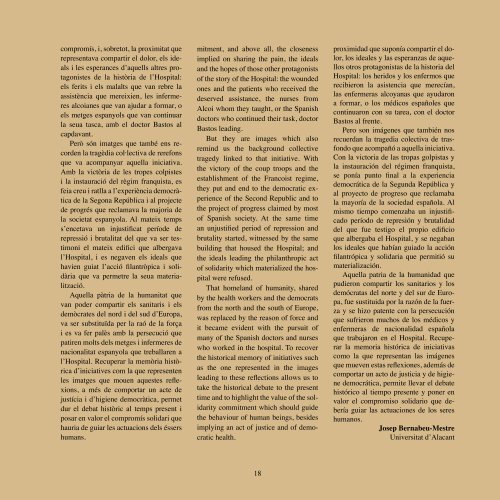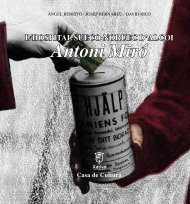L_Hospital Sueco-Noruec-final
Create successful ePaper yourself
Turn your PDF publications into a flip-book with our unique Google optimized e-Paper software.
compromís, i, sobretot, la proximitat que<br />
representava compartir el dolor, els ideals<br />
i les esperances d’aquells altres protagonistes<br />
de la història de l’<strong>Hospital</strong>:<br />
els ferits i els malalts que van rebre la<br />
assistència que mereixien, les infermeres<br />
alcoianes que van ajudar a formar, o<br />
els metges espanyols que van continuar<br />
la seua tasca, amb el doctor Bastos al<br />
capdavant.<br />
Però són imatges que també ens recorden<br />
la tragèdia col·lectiva de rerefons<br />
que va acompanyar aquella iniciativa.<br />
Amb la victòria de les tropes colpistes<br />
i la instauració del règim franquista, es<br />
feia creu i ratlla a l’experiència democràtica<br />
de la Segona República i al projecte<br />
de progrés que reclamava la majoria de<br />
la societat espanyola. Al mateix temps<br />
s’encetava un injustificat període de<br />
repressió i brutalitat del que va ser testimoni<br />
el mateix edifici que albergava<br />
l’<strong>Hospital</strong>, i es negaven els ideals que<br />
havien guiat l’acció filantròpica i solidària<br />
que va permetre la seua materialització.<br />
Aquella pàtria de la humanitat que<br />
van poder compartir els sanitaris i els<br />
demòcrates del nord i del sud d’Europa,<br />
va ser substituïda per la raó de la força<br />
i es va fer palès amb la persecució que<br />
patiren molts dels metges i infermeres de<br />
nacionalitat espanyola que treballaren a<br />
l’<strong>Hospital</strong>. Recuperar la memòria històrica<br />
d’iniciatives com la que representen<br />
les imatges que mouen aquestes reflexions,<br />
a més de comportar un acte de<br />
justícia i d’higiene democràtica, permet<br />
dur el debat històric al temps present i<br />
posar en valor el compromís solidari que<br />
hauria de guiar les actuacions dels éssers<br />
humans.<br />
mitment, and above all, the closeness<br />
implied on sharing the pain, the ideals<br />
and the hopes of those other protagonists<br />
of the story of the <strong>Hospital</strong>: the wounded<br />
ones and the patients who received the<br />
deserved assistance, the nurses from<br />
Alcoi whom they taught, or the Spanish<br />
doctors who continued their task, doctor<br />
Bastos leading.<br />
But they are images which also<br />
remind us the background collective<br />
tragedy linked to that initiative. With<br />
the victory of the coup troops and the<br />
establishment of the Francoist regime,<br />
they put and end to the democratic experience<br />
of the Second Republic and to<br />
the project of progress claimed by most<br />
of Spanish society. At the same time<br />
an unjustified period of repression and<br />
brutality started, witnessed by the same<br />
building that housed the <strong>Hospital</strong>; and<br />
the ideals leading the philanthropic act<br />
of solidarity which materialized the hospital<br />
were refused.<br />
That homeland of humanity, shared<br />
by the health workers and the democrats<br />
from the north and the south of Europe,<br />
was replaced by the reason of force and<br />
it became evident with the pursuit of<br />
many of the Spanish doctors and nurses<br />
who worked in the hospital. To recover<br />
the historical memory of initiatives such<br />
as the one represented in the images<br />
leading to these reflections allows us to<br />
take the historical debate to the present<br />
time and to highlight the value of the solidarity<br />
commitment which should guide<br />
the behaviour of human beings, besides<br />
implying an act of justice and of democratic<br />
health.<br />
proximidad que suponía compartir el dolor,<br />
los ideales y las esperanzas de aquellos<br />
otros protagonistas de la historia del<br />
<strong>Hospital</strong>: los heridos y los enfermos que<br />
recibieron la asistencia que merecían,<br />
las enfermeras alcoyanas que ayudaron<br />
a formar, o los médicos españoles que<br />
continuaron con su tarea, con el doctor<br />
Bastos al frente.<br />
Pero son imágenes que también nos<br />
recuerdan la tragedia colectiva de trasfondo<br />
que acompañó a aquella iniciativa.<br />
Con la victoria de las tropas golpistas y<br />
la instauración del régimen franquista,<br />
se ponía punto <strong>final</strong> a la experiencia<br />
democrática de la Segunda República y<br />
al proyecto de progreso que reclamaba<br />
la mayoría de la sociedad española. Al<br />
mismo tiempo comenzaba un injustificado<br />
período de represión y brutalidad<br />
del que fue testigo el propio edificio<br />
que albergaba el <strong>Hospital</strong>, y se negaban<br />
los ideales que habían guiado la acción<br />
filantrópica y solidaria que permitió su<br />
materialización.<br />
Aquella patria de la humanidad que<br />
pudieron compartir los sanitarios y los<br />
demócratas del norte y del sur de Europa,<br />
fue sustituida por la razón de la fuerza<br />
y se hizo patente con la persecución<br />
que sufrieron muchos de los médicos y<br />
enfermeras de nacionalidad española<br />
que trabajaron en el <strong>Hospital</strong>. Recuperar<br />
la memoria histórica de iniciativas<br />
como la que representan las imágenes<br />
que mueven estas reflexiones, además de<br />
comportar un acto de justicia y de higiene<br />
democrática, permite llevar el debate<br />
histórico al tiempo presente y poner en<br />
valor el compromiso solidario que debería<br />
guiar las actuaciones de los seres<br />
humanos.<br />
Josep Bernabeu-Mestre<br />
Universitat d’Alacant<br />
18




